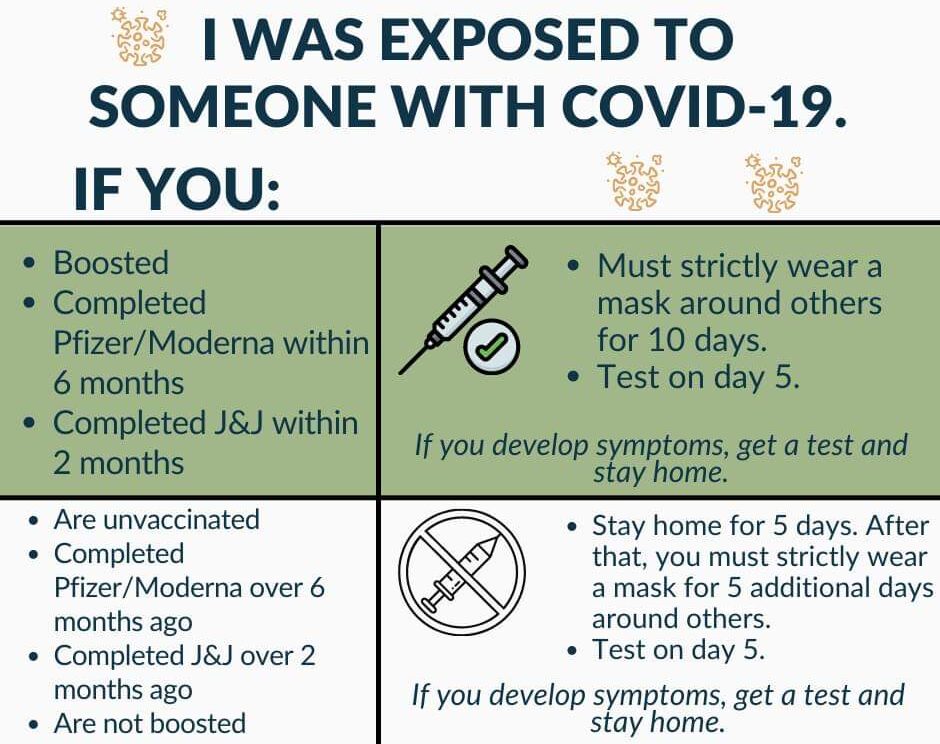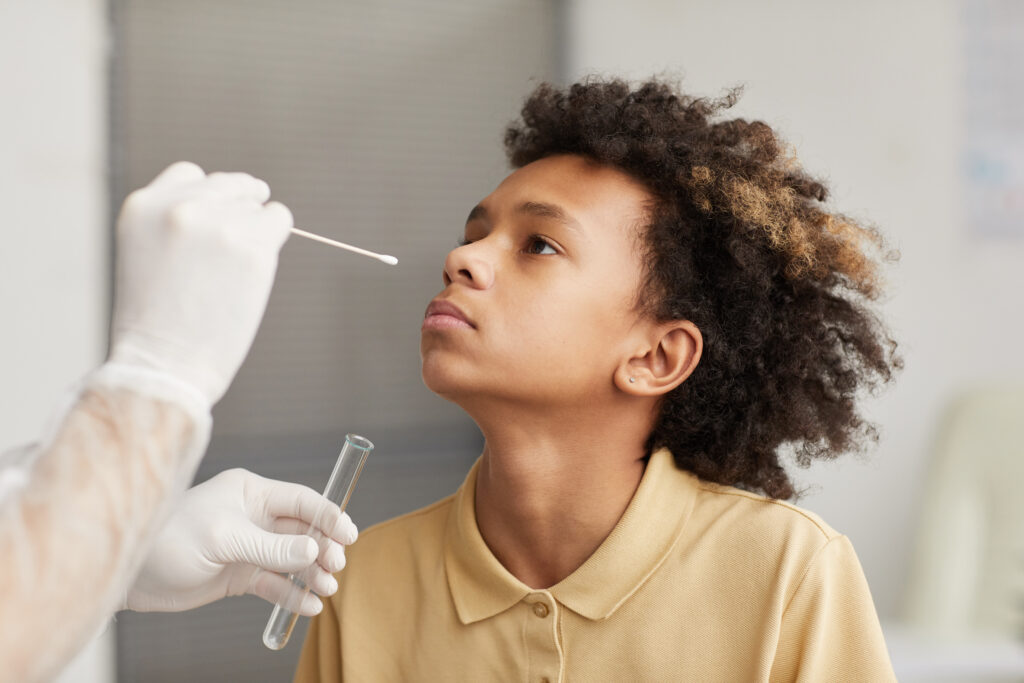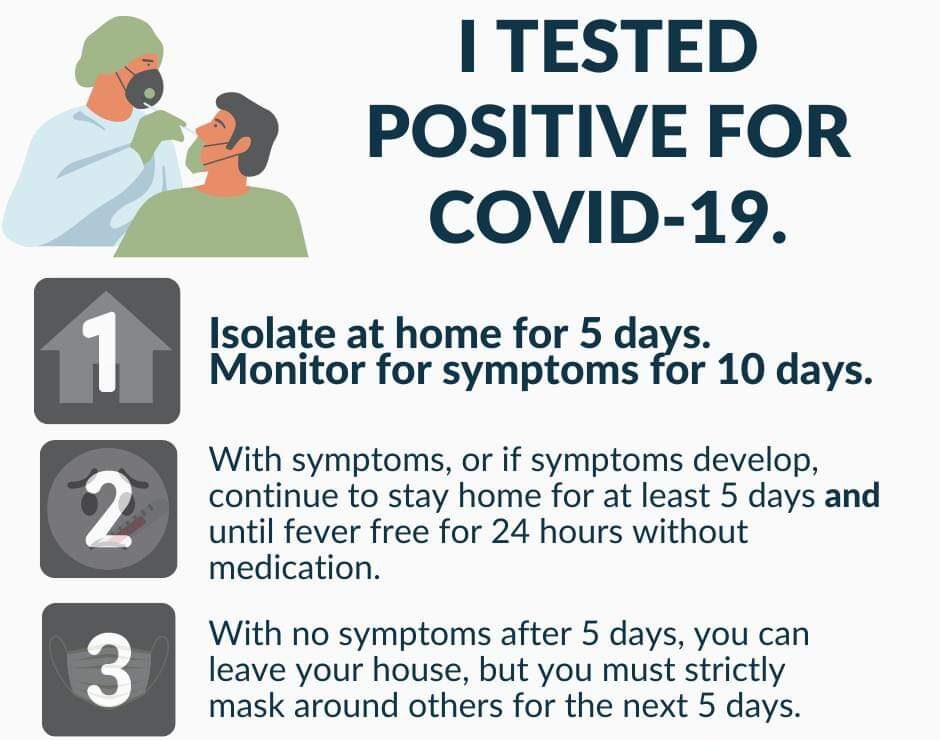What To Do If Exposed To COVID-19
Ene 05, 2022
CDC Updates and Shortens Recommended Isolation and Quarantine Period for General Population
If you have come in close contact with someone who has COVID-19, it is important to follow current quarantine, masking, and testing protocols. Protocols have recently changed per CDC recommendations. Close contact denotes having been within 6 feet of someone for a cumulative total of 15 minutes or more over a 24-hour period.
New Quarantine Period For Fully Vaccinated
Fully Vaccinated
After close contact with someone who has COVID-19, those who are fully vaccinated must strictly wear a mask around others for 10 days. After 5 days, get tested for COVID-19. If your test results are negative, you may resume normal activities. If at any time you develop symptoms of COVID-19, get tested and stay home.
To be considered fully vaccinated you must meet the following criteria:
- Received both doses of either the Moderna or Pfizer vaccines within the past 6 months.
- Received both doses of either the Moderna or Pfizer vaccines and a booster shot within the past 6 months.
- Received the Johnson & Johnson vaccine within the past 2 months.
- Received the Johnson & Johnson vaccine and a booster shot within the past 6 months.
New Quarantine Period For Partially Vaccinated & Unvaccinated
Partially Vaccinated or Unvaccinated
After close contact with someone who has COVID-19, those who are partially vaccinated or unvaccinated must stay home for 5 days. After 5 days, get tested for COVID-19. You must then strictly wear a mask for an additional 5 days. If at any time you develop symptoms of COVID-19, get tested and stay home.
Those considered to be partially vaccinated or unvaccinated include those who:
- Received both doses of either the Moderna or Pfizer vaccines over 6 months ago and have not been boosted.
- Received 1 dose of either the Moderna or Pfizer vaccines but have not had the second dose.
- Received the Johnson & Johnson vaccine over 2 months ago and have not been boosted.
- Have not received an approved vaccine — Moderna, Pfizer, or Johnson & Johnson — unvaccinated.
Other Safety Measures
- Continue practicing good hygiene by washing your hands.
- Watch for fever (100.4 F), cough, shortness of breath, or other COVID-19 symptoms.
- If possible, stay away from people you live with who are at higher risk for becoming very sick from COVID-19.
- Contact HealthCore to schedule a COVID-19 test if needed.

COVID-19 Tests Near Me
Getting Tested for COVID-19 in Wichita
Obtaining at-home COVID tests remains difficult. To avoid overwhelming medical facilities with patients seeking testing, consider these alternative community testing options: Sedgwick County Health Department and Wichita State University provide free PCR testing with results in less than 24 hours (often in about 8 hours).
Current patients of HealthCore can schedule a test at HealthCore Clinic.

CDC: For Immediate Release: Monday, December 27, 2021
CDC Updates and Shortens Recommended Isolation and Quarantine Period for General Population
Given what we currently know about COVID-19 and the Omicron variant, CDC is shortening the recommended time for isolation for the public. People with COVID-19 should isolate for 5 days and if they are asymptomatic or their symptoms are resolving (without fever for 24 hours), follow that by 5 days of wearing a mask when around others to minimize the risk of infecting people they encounter. The change is motivated by science demonstrating that the majority of SARS-CoV-2 transmission occurs early in the course of illness, generally in the 1-2 days prior to onset of symptoms and the 2-3 days after.
Additionally, CDC is updating the recommended quarantine period for anyone in the general public who is exposed to COVID-19. For people who are unvaccinated or are more than six months out from their second mRNA dose (or more than 2 months after the J&J vaccine) and not yet boosted, CDC now recommends quarantine for 5 days followed by strict mask use for an additional 5 days. Alternatively, if a 5-day quarantine is not feasible, it is imperative that an exposed person wear a well-fitting mask at all times when around others for 10 days after exposure. Individuals who have received their booster shot do not need to quarantine following an exposure, but should wear a mask for 10 days after the exposure. For all those exposed, best practice would also include a test for SARS-CoV-2 at day 5 after exposure. If symptoms occur, individuals should immediately quarantine until a negative test confirms symptoms are not attributable to COVID-19.
Isolation relates to behavior after a confirmed infection. Isolation for 5 days followed by wearing a well-fitting mask will minimize the risk of spreading the virus to others. Quarantine refers to the time following exposure to the virus or close contact with someone known to have COVID-19. Both updates come as the Omicron variant continues to spread throughout the U.S. and reflects the current science on when and for how long a person is maximally infectious. These recommendations do not supersede state, local, tribal, or territorial laws, rules, and regulations, nor do they apply to healthcare workers for whom CDC has updated guidance.
Data from South Africa and the United Kingdom demonstrate that vaccine effectiveness against infection for two doses of an mRNA vaccine is approximately 35%. A COVID-19 vaccine booster dose restores vaccine effectiveness against infection to 75%. COVID-19 vaccination decreases the risk of severe disease, hospitalization, and death from COVID-19. CDC strongly encourages COVID-19 vaccination for everyone 5 and older and boosters for everyone 16 and older. Vaccination is the best way to protect yourself and reduce the impact of COVID-19 on our communities.
The following is attributable to CDC Director, Dr. Rochelle Walensky:
“The Omicron variant is spreading quickly and has the potential to impact all facets of our society. CDC’s updated recommendations for isolation and quarantine balance what we know about the spread of the virus and the protection provided by vaccination and booster doses. These updates ensure people can safely continue their daily lives. Prevention is our best option: get vaccinated, get boosted, wear a mask in public indoor settings in areas of substantial and high community transmission, and take a test before you gather.”
